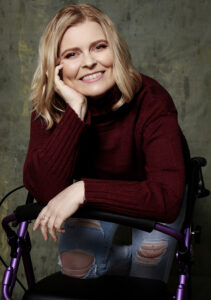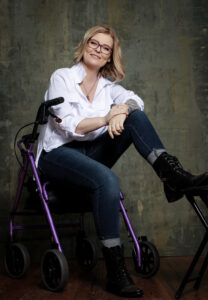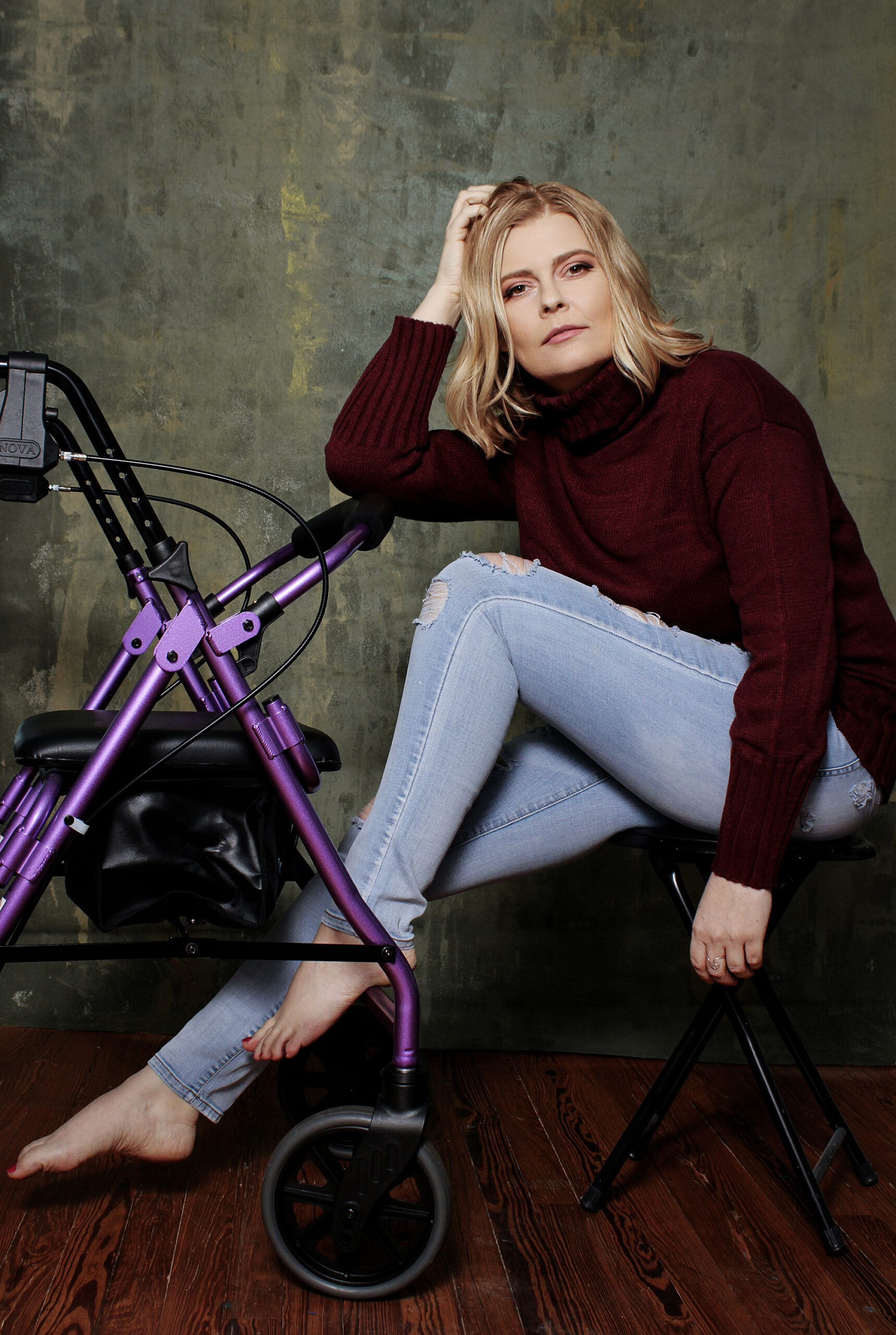
The Truth About
Being
A Young Person With
Disabilities
Being a young person living with disability comes with extra challenges.
If you have a chronic illness, and you're a young person, at some point you've probably been dismissed, disbelieved or accused of 'faking it' (there's a reason the hashtag #patientsarenotfaking is trending on twitter). If you have to use a mobility aid, like I do now, you may experience judgment, get strange looks, pity or even minimizing comments like 'it can't be THAT bad...'. These systemic beliefs and behaviors lead to a cycle of young patients not getting the support they need, and more concerningly, isolates them within their own experience.
Keep reading to learn the Truth about being a young person with disabilities.
How does being a young person with disability bring extra challenges?
Worldwide, youth with disabilities are among the poorest and most marginalized of the world's youth population (un.org). If you're a person living with a disability age 0-18, you're more likely to face severe social, economic and civic disparities, even in the most developed countries. You're also less likely to have access to educational and economic opportunities and experience exclusion, isolation and even abuse.
If you're a young adult (age 16-24) or emerging adult (age 18-30) living with a disability, whether you were born with a developmental or intellectual disability or were diagnosed with a chronic health condition at an early age in life, you're more likely to experience extra challenges. Challenges, such as uncertainty in your ability to live independently and achieve successful employment due to the fact that you might experience difficulty beginning, advancing or completing your higher education goals, can make you more vulnerable to poorer outcomes. Educational establishments are often unprepared in accommodating young people with disabilities or don't provide students with what they need to succeed in the academic setting. Young people with chronic illness & disability are more likely to live in poverty than their peers, lack adequate healthcare access, and are even 3x more likely to attempt suicide.
So, while this article was originally going to discuss the stigma of being a young person using a mobility aid, it's actually much bigger than that. Being a young person with any chronic condition not only brings stigma, it makes life significantly more challenging.

And it's more common than we recognize.
Especially chronic pain - in fact, in a University of Alabama study, 'about 25% of young adults age 18-29 experience chronic pain, enough to interfere with daily activities. They also found that these student's pain was often invalidated by friends and family and they perceived a strong stigma associated with having pain at an age when chronic illness is not expected that made them feel isolated among their healthy peers. They were also more likely to push themselves to their physical limits and avoided seeking medical or psychological help in an effort to mask their conditions.'
When I was diagnosed with my first chronic illness, I was not even 30 yet. I had just started graduate school at one of the top schools in the country and had already experienced strange symptoms even earlier in my youth that doctors just couldn't explain. You see, young adults and teens are presumed to be healthy and free of any serious health adversities, But I know all too well, that disease and disability do not discriminate by age or life circumstance.
Now that I'm 35, I've already had to completely change my career and living situation several times due to chronic illness. I even recently had yet another new diagnosis, leaving me with 4 major chronic and incurable conditions, and almost a dozen smaller symptom related diagnoses, with no health insurance. I have no retirement savings, massive student loan, life expense and health related debt and can't plan for even a month in the future due to the unpredictability of my illnesses.
This is the reality of life with chronic illness for young people.
I recently made the difficult decision to start using a mobility aid due to the risks associated with my newly diagnosed autonomic nervous system related condition: postural orthostatic tachycardia syndrome (POTS). Like myself, many young adults facing the use of a mobility device are afraid to get them. In fact, young people take actions to avoid their disability being visible if at all possible, in order to avoid experiencing stigma.
Let me break down for you what that means.
Young people are making active decisions that are not in the best interest of their own health care, in order to avoid the trauma that comes with stigma around illness and disability.
And it's not only the actual stigma, the mark of shame or unfair cultural beliefs that society or group of people have about a characteristic or behavior of a person, it's the anticipated stigma that also causes distress.
People living with chronic illness and disability have learned to EXPECT others to devalue them based solely on the fact that they have a chronic illness or disability, whether its visible or invisible. They anticipate prejudice, discrimination and stereotyping will be directed at them at some point in the future. This greatly affects the persons quality of life and undermines their physical and mental wellness. And this isn't just people they don't know, who they anticipate this from, it's their closest friends and family - people who are supposed to support them most in a time of need, who perpetuate these feelings of shame or devaluation.
Now that we've looked at an overview of stigma, the underpinnings of these extra challenges, let's look at how this looks in everyday life.
What do these extra challenges look like in real life?
Here are some real life descriptions of how life with chronic illness & disability affects youth and emerging adults...
educationally
- Students drop out of programs early due to frustration of trying to navigate academic environments without support
- Young people being forced to choose between education for future careers and working now to support themselves financially. Guess which one tends to win out?
- Young people choosing ultimately not to pursue educational or personal development due to not being offered appropriate accommodations to succeed.
at work
- Young people quitting their jobs to tend to their health.
- Young people moving back in with their parents or never being able to fully 'launch' into their own independent lives.
- Young people who do work, hiding their illnesses and therefore not attending to their health needs, out of fear of losing their jobs or being discriminated against at work.
- Young people at work disclosing their illness out of necessity, only to be demoted, have hours reduced or endure workplace bullying, stigma and discrimination.
economically
- Young people starting their lives financially dependent on others.
- Young people in debt due to trying to maintain independence and attend to rising healthcare costs out of necessity.
- Young people without supports ending up homeless or stuck in a cycle of relying on disability while also not wanting to appear 'too disabled' or as if they're not trying to better themselves.
- Young people forced to choose between qualifying for services to help with healthcare and financial burdens and pursuing meaningful activities to help them feel whole. (Ie not getting married due to it affecting disability status or not pursuing part time work they might enjoy out of fear of losing healthcare and financial benefits they would still need to survive.)
- 'There are 9.53 million young adults in America with a chronic disease or disability, however not all of them have adequate insurance. And even with insurance, many lack access to quality healthcare. Though the Affordable Care Act (ACA) has allowed young adults to stay on their parents’ insurance until they are 26, many fall through the cracks after they have to establish their own insurance. Some young adults are experiencing a gap in coverage for illnesses that need chronic care, including asthma, diabetes, heart disease, HIV/AIDS; and physical, intellectual, and emotional disabilities that are episodic and more unpredictable. “In college, they may not qualify for school-based health insurance because of difficulty in maintaining full-time status because of their medical issues. They have difficulty obtaining employment-based insurance coverage because they cannot obtain full-time employment in mid- to large-size companies and, about 74% who met childhood Medicaid’s eligibility criteria fail to meet Social Security income (SSI) disability criteria, which is necessary for adult Medicaid eligibility. Thus, they are forced into low-income jobs or unemployment to qualify for and maintain SSI eligibility,” the study points out. Even those who can secure Medicaid assistance have a hard time finding physicians who can help them transition from pediatric to adult care.' , According to Medical Economics.
in relationships
- avoiding using mobility aids due to their friends and family believing they don't 'actually' need them
- people close to them expressing disbelief in the extent to which they could 'possibly' be disabled by saying things like 'you're too young to be that sick' or 'you don't look that sick'. This immediately isolates them from their support system.
- Friends and family 'bailing' on them due to missing social events and activities because they're too sick to attend and eventually just not inviting or including them anymore.
- Friends and family making them feel guilty for not coming to events or social gatherings by using their good days against them. ex: 'Well I saw you went to the grocery store yesterday and then bailed on my party' or 'I don't understand how you can go to work but then never come hang out with me on the weekends', not understanding that the person with chronic illness has to prioritize required activities due to limited energy reserves.
- Friends and family giving unsolicited advice about 'how to get better' and then making the person feel guilty or shame them if they don't take it or have already tried it and found it unhelpful. This perpetuates the mentality that patients don't have the agency to make health decisions for themselves or that others who are more able in their health know better.
- Friends and family offering financial assistance using that as a reason to employ unrealistic expectations on the person living with illness and dangling it as a carrot toward influencing them to make decisions not in their own best interest or removing their agency to self manage their own health. ex:'If I'm paying for this treatment, then I get to choose what doctors you see and what kind of programs we pursue'.
mentally/ emotionally
- People accusing illness of being related to weight, laziness or bad lifestyle choices places blame on the person, leading them to experience guilt and shame and lowers self worth.
- Others making suggestions or actual decisions for the person removes their agency, taking them out of the drivers seat of their own health and wellness 'vehicle'. Research shows this loss of agency leads to poor health outcomes.
- While all of these experiences above are happening, the person is still privately grieving the loss of their abilities and independence because having a chronic illness brings grief and a great deal of stress.
- People with chronic illness and disability experience higher rates of depression, anxiety and suicidality than their able bodied counterparts.
- Repeated worries about their symptoms, limitations, risks and lack of confidence in their ability to manage it all makes it so difficult to navigate life that they begin to develop avoidance behaviors and can even have PTSD from trauma related to this experience.
- Dwindling social supports leaves the person isolated and lonely, leaving them less resilient to face the challenges each day presents to them moving forward.
I've personally experienced 15 of these examples. And I'm someone with a very strong sense of agency and decent social supports!
I went to the DMV last week to submit my paperwork from my doctor allowing me the use of a handicap permit. I avoided doing it for two weeks because I was SO AFRAID of what people might think if I didn't look 'sick enough' to have one. Ironically enough, that day was a tough day for my body, and I required the use of my walker to get from the parking lot to the building, and then again in case there weren't seats available. Of course, they called my number to a STANDING ONLY counter to process my disability application, where I sat in my walker seat with such gratitude that I had made the decision to bring it, despite my worries (The irony was not lost on me there). I felt so vulnerable and exposed the entire time - I cried afterwards in my car. The emotional weight of constantly having to navigate these anticipatory real life challenges, is heavy. It should have been easier to make this decision for myself! We need to be able to be more assertive in asking for what we need to navigate the world with physical challenges, not jump extra physical and emotional hurdles in doing so.
I want to end this article by saying this:
- It is not the responsibility of disabled individuals to help you understand their experience. Do your own research. Learn more on your own using your own agency and abilities. People with disabilities and illness tire of repeatedly having to justify or explain their situation.
- It IS their responsibility and number 1 job to take care of themselves. Let them do that! They know what is best for their body and mind and making their own decisions is going to help them have better health outcomes.
- It is NOT a realistic expectation in chronic illness to reach a cure or absence of disability. Disability is NOT a bad word. We don't need to be called 'handicapable' or told 'don't let your illness define you'. Instead, listen and respect the person living with chronic illness and/or disability. They do NOT have to have mobility aids to 'count' as disabled. You can be disabled and still walk.
- 6 in 10 people in this country have at least one chronic illness and 4 in 10 have 2 or more. We are not the minority. Anyone, anywhere, any time, any age, any culture, any religion, subscribing to any lifestyle can become disabled and/or chronically ill.
Want to read more articles, check out my youtube videos and get notified when I launch another online group class? Sign up for my email list!
Are you looking for support?
Sign up for the next LAUNCH of our first 6 week virtual support group:
Take Charge: A Chronic Illness Coping Support Group
Simply fill out the contact form and say 'I'm interested in your support group' and I'll send you details!












